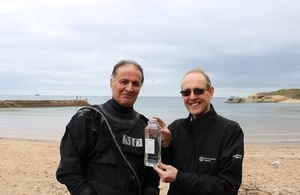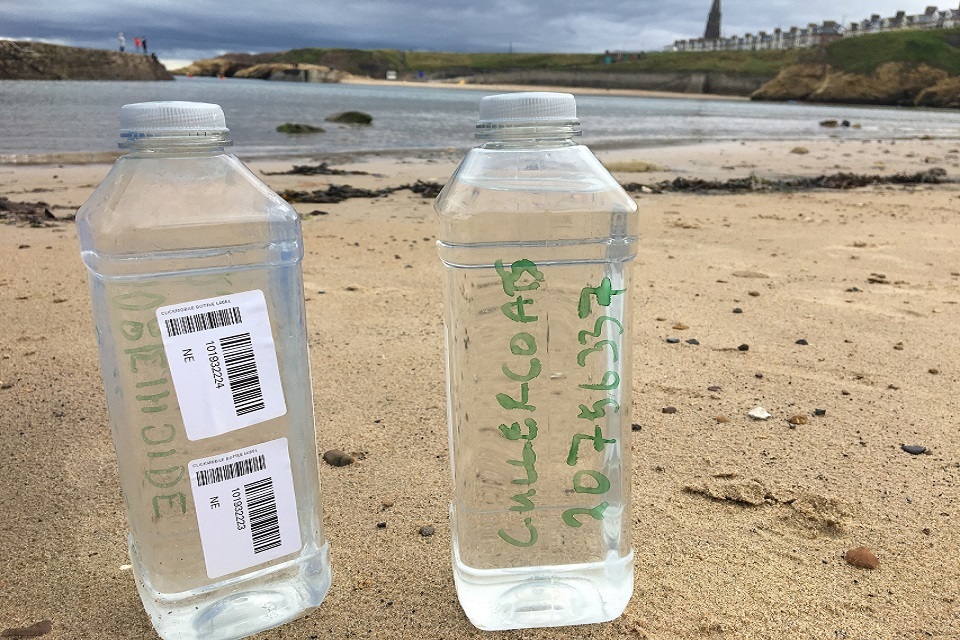Bathing water investigation continues
The Environment Agency is working closely with partners to investigate the bathing water quality at a popular North East beach.

Environment Agency Chief Executive Sir James Bevan with the Environment Agency's Mick Donkin
Investigations are continuing into the bathing water quality of a popular North East beach.
Cullercoats in North Tyneside is currently rated as ‘sufficient’, meaning it has passed bathing water quality standards. But work to understand the reasons for its decline in quality from ‘good’ are ongoing.
On Wednesday (22 August) Environment Agency Chief Executive Sir James Bevan visited the bay to hear about the work being done by the agency and its partners at Northumbrian Water and North Tyneside Council to investigate and understand the issues.
A number of factors can impact on bathing water quality, including the impact of humans, animals and birds, misconnections of pipes going into the sea, and heavy rainfall, which can result in run off from the land going into the sea and causing a temporary drop in seawater quality.
During recent years, the Environment Agency has seen that bathing water quality at Cullercoats deteriorates towards the end of the season. A partnership working group was set up in 2017 to investigate the issues and work has continued throughout this year.
The Environment Agency is carrying out additional monitoring at suspected sources of pollution and further microbial source tracking (MST) which through DNA analysis identifies the sources of bacteria predominantly present in the seawater.
Northumbrian Water is carrying out extensive investigations on the drainage network and is working with partners to resolve any issues found. This has involved checking a previously blocked up culvert owned by North Tyneside Council that was identified as having discharged poor quality water to the beach in 2011. The working group is also investigating potential misconnections from properties discharging into the surface water outlets rather than the sewer.

The image shows the Environment Agency's Mick Donkin collecting samples at Cullercoats
‘Drastic improvements
The Environment Agency’s Gordon Reid, who leads on the Environment Agency’s activity in the North East, said:
The North East remains a beacon for bathing water excellence with a real success story of drastic improvements over the past 30 years. In 1988, nearly half of our bathing waters failed to meet mandatory standards, while in the most recent assessment they all passed. We’d encourage people to make the most of our wonderful coastline by getting out and enjoying it!
We work closely with our partners at local authorities and Northumbrian Water to understand what impacts on a particular bathing water’s quality and then carry out work to try to improve it, and such work has already taken place here at Cullercoats.
We remain committed to identifying all sources of pollution and a number of investigations are taking place to understand the type of bacteria in the water and where it is potentially coming from. It’s important to note that ‘sufficient’ status still means the bathing water has passed water quality standards.

Image shows the samples collected at Cullercoats
Partnership working is important
All of the North East’s Bathing Waters passed water quality standards in the most recent assessment at the end of last year with 32 out of 34 being rated excellent or good and 2 being rated sufficient.
Compliance is based on the current and previous four years of sample data (a maximum of 80 samples per beach, from 2014 to 2017). The samples are taken by the Environment Agency between May and September each year to assess the bathing waters against the strict regulations.
Northumbrian Water’s wastewater director, Richard Warneford, said:
Looking after the environment is at the heart of what we do. We are extremely proud of the contribution we have made to protect and improve our region’s stunning coastline through both investment and partnership working and we appreciate the significant impact that beaches have on tourism, the economy and the leisure industry.
Partnership working is particularly important in understanding the issues affecting bathing water quality and to provide the improvements needed”.
Across the UK 98.3% of bathing waters tested at over 400 beaches and lakes passed tough water quality standards. Action plans are in place for all bathing waters in need of improvement.
The public have a key role to play in ensuring their local beaches are clean. They can do their bit by ensuring they #binit4beaches and take their litter home with them.
You can check for temporary warnings against bathing, or see the sampling results online